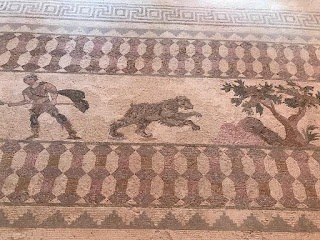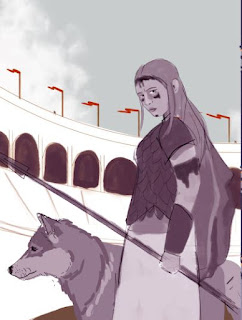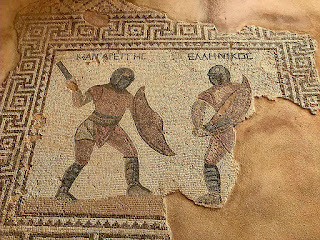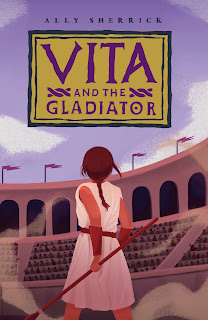One of my favourite movies of all time is Gladiator. The multi Oscar-winning film, directed by Ridley Scott, stars Russell Crowe as wronged army commander turned gladiator-slave, Maximus Decimus Meridius who – spoiler alert! – seeks vengeance for the murder of his wife and child by his bitter enemy and rival, Emperor-in-waiting, Commodus.
It features all the classic ingredients of a great ‘swords and sandals’ epic – bravery, heroism and self-sacrifice plus a liberal dose of blood, sweat and the brutality of gladiatorial combat.When I set out to write my latest book, Vita and the Gladiator a story of my own set in that world, I wanted to make it about a hero who, like Maximus Decimus, finds themselves pitched into the arena against their will and forced to use their wits and courage to fight back.
But while the film depicts a pretty much all-male world, the original inspiration for my story was sparked by a more unusual pair of gladiatorial fighters. These are Amazon and Achillia – two female gladiators (or gladiatrices as they are now known) whose memory is preserved in a stone relief from the ancient town of Halicarnassus (modern day Turkey) now housed in the British Museum.
Female gladiators were a rarity. In Roman society, women were expected to conform to the ideal of the Roman matron – to be decent, beautiful and devoted to their husband and family. The notion that they might want to fight in the arena was shocking. Nevertheless, there is both documentary and archaeological evidence – like the stone relief – that they did and that they drew the crowds too.
This discovery got my story whiskers twitching. Then, as I delved further into the world of the Roman arena, I discovered that women are recorded as having taken part in beast-hunts too. Known as venatores, beast-hunters were pitched against wild animals – both exotic ones like lions, tigers and even crocodiles – or, as was most likely the case in Roman Britain where my book is set, the more home-grown sort, like wild boar, bulls and bears.
In truth, Brea, a native Briton, is a female beast-hunter (or venatrix) with her own dark back-story. At first Vita is terrified of the pair, but gradually, as she comes to trust Brea (known as Lupa or ‘the She-Wolf’ in the arena), she discovers they have a common enemy – one they must stand against together in the name of truth and justice.
The world of the gladiator is an alien one to us – barbaric and cruel-seeming. But at the time, the arena was the place where imperial justice was seen to be served and a sense of order reinforced – a reminder of the power of the Emperor in Rome and the meaning and worth of Roman citizenship. As such, it was a world with its own rules. But Vita has never been permitted to watch a gladiatorial games by her parents – women were in the minority in the audience as well as out in the ring. And one of the great things about writing the book was to have my hero – and the reader – discover these rules as the story unfolds.
For example Vita soon learns that most gladiators are either prisoners-of-war sold by their captors to fight in the arena, criminals sentenced to die by the sword or else condemned to the games, or slaves considered too unruly by their masters to keep. Though as she discovers, there are also the foolhardy types who volunteer for gladiator-school too.
Also that gladiators have to swear an oath – the sacramentum gladiatorum - agreeing to be ‘burnt by fire, bound in chains, beaten and killed by the sword’ as their master (the lanista) commands. And that fighters are only permitted to use wooden weapons during training for fear they might stage a revolt.
Vita – and Brea’s – survival depends on understanding how this strange and dangerous world works. But also on knowing when and how they can break the rules, as you’ll find if you read the book ...
Writing Challenge
Imagine that like Vita, you find yourself in a grand arena in front of crowds of baying spectators with little or no training. As you look around you, what do you see; hear; smell? Who is your opponent and how are they armed? What chance do you think you have of beating them and how does that make you feel? Die or survive to fight another day? It’s down to you!
Ally Sherrick is the award-winning author of stories full of history, mystery and adventure. You can find out more about her by visiting her website. Ally’s latest book, just published with Chicken House Books, is Vita and the Gladiator, the story of a young girl’s fight for justice in the high-stakes world of London’s gladiatorial arena.
Ally's books are widely available in high street bookshops and online.
For more information visit Ally's website.






